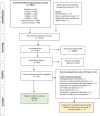Enhancing shared and surrogate decision making for people living with dementia: A systematic review of the effectiveness of interventions
- PMID: 33248009
- PMCID: PMC7879553
- DOI: 10.1111/hex.13167
Enhancing shared and surrogate decision making for people living with dementia: A systematic review of the effectiveness of interventions
Abstract
Background: Dementia can have a profound impact on decision making. People living with dementia (PLwD) often need to make decisions about health care, and, as dementia progresses, decisions may need to be made on their behalf. Specific interventions may support this process.
Review question: What interventions are effective in improving shared decision making or surrogate decision making on the health care of PLwD?
Methods: A narrative systematic review of existing literature was conducted. Seven databases, grey literature and key journals were searched. After exclusion by title, abstracts then full texts were reviewed collaboratively to manage any disagreements.
Results: Eight studies met the inclusion criteria. Two articles, including one RCT, evaluated decision aids regarding the use of enteral feeding in advanced dementia. Six further articles, including five RCTs, were found which evaluated the effectiveness of interventions supporting patients or carers with advance care planning.
Conclusion: Decision-making interventions typically consist of multiple components which aim to establish preferences for future health care. Advance care planning interventions supported aspects of the decision-making processes but their impact on decision quality was rarely evaluated. Interventions did not increase the concordance of decisions with a person's values. The decision-specific interventions are unlikely to produce benefit in other decision contexts.
Patient involvement: Two caregivers, a public stakeholder group and a carer group were consulted in the design of the wider study to which this review relates. Six PLwD refined the research questions addressed in this paper.
Keywords: cognitive impairment; decision making; dementia; proxy decision making; shared decision making.
© 2020 The Authors Health Expectations published by John Wiley & Sons Ltd.
Figures
Similar articles
-
Folic acid supplementation and malaria susceptibility and severity among people taking antifolate antimalarial drugs in endemic areas.Cochrane Database Syst Rev. 2022 Feb 1;2(2022):CD014217. doi: 10.1002/14651858.CD014217. Cochrane Database Syst Rev. 2022. PMID: 36321557 Free PMC article.
-
Providing support to surrogate decision-makers for people living with dementia: Healthcare professional, organisational and community responsibilities.Health Soc Care Community. 2017 Sep;25(5):1563-1570. doi: 10.1111/hsc.12456. Epub 2017 Jun 1. Health Soc Care Community. 2017. PMID: 28569431
-
Decision making for people living with dementia by their carers at the end of life: a rapid scoping review.Int J Palliat Nurs. 2017 Sep 2;23(9):446-456. doi: 10.12968/ijpn.2017.23.9.446. Int J Palliat Nurs. 2017. PMID: 28933994
-
Beyond the black stump: rapid reviews of health research issues affecting regional, rural and remote Australia.Med J Aust. 2020 Dec;213 Suppl 11:S3-S32.e1. doi: 10.5694/mja2.50881. Med J Aust. 2020. PMID: 33314144
-
Decision-making on behalf of people living with dementia: how do surrogate decision-makers decide?J Med Ethics. 2017 Jan;43(1):35-40. doi: 10.1136/medethics-2015-103301. Epub 2016 Oct 25. J Med Ethics. 2017. PMID: 27780889
Cited by
-
Acceptability of Using a Decision Aid to Support Family Carers of People With Dementia Towards the End of Life: A Qualitative Study.Health Expect. 2024 Jun;27(3):e14123. doi: 10.1111/hex.14123. Health Expect. 2024. PMID: 38896012 Free PMC article.
-
Rapid development of a COVID-19 care planning decision-aid for family carers of people living with dementia.Health Expect. 2022 Aug;25(4):1954-1966. doi: 10.1111/hex.13552. Epub 2022 Jun 18. Health Expect. 2022. PMID: 35716078 Free PMC article.
-
Patient engagement strategies for adults with chronic conditions: an evidence map.Syst Rev. 2022 Mar 5;11(1):39. doi: 10.1186/s13643-021-01873-5. Syst Rev. 2022. PMID: 35248149 Free PMC article.
-
A decision aid to support family carers of people living with dementia towards the end-of-life: Coproduction process, outcome and reflections.Health Expect. 2021 Oct;24(5):1677-1691. doi: 10.1111/hex.13307. Epub 2021 Jul 19. Health Expect. 2021. PMID: 34288291 Free PMC article.
-
Feasibility and Acceptability of the "About Me" Care Card as a Tool for Engaging Older Adults in Conversations About Cognitive Impairment.Ann Fam Med. 2025 Mar 24;23(2):117-126. doi: 10.1370/afm.240165. Ann Fam Med. 2025. PMID: 40127970 Free PMC article.
References
-
- National Collaborating Centre for Mental Health . Dementia. British Psychological Society & Royal College of Psychiatrists. National Collaborating Centre for Mental Health; 2007.
-
- Alzheimer’s Disease International . World Alzheimer’s Report 2015: The Global Impact of Dementia [Internet]. London: Alzheimer’s Disease International; 2015.
-
- Chau PH, Kwok T, Woo J, Chan F, Hui E, Chan KC. Disagreement in preference for residential care between family caregivers and elders is greater among cognitively impaired elders group than cognitively intact elders group. Int J Geriatr Psychiatry. 2010;25:46‐54. - PubMed
-
- Kerr K, Curl C, Geddis‐Regan A. The impact of dementia on oral health and dental care, part 1: Setting the scene for dental care Provision. Prim Dent J 2020;9:24‐30. - PubMed
Publication types
MeSH terms
LinkOut - more resources
Full Text Sources
Medical
Miscellaneous


